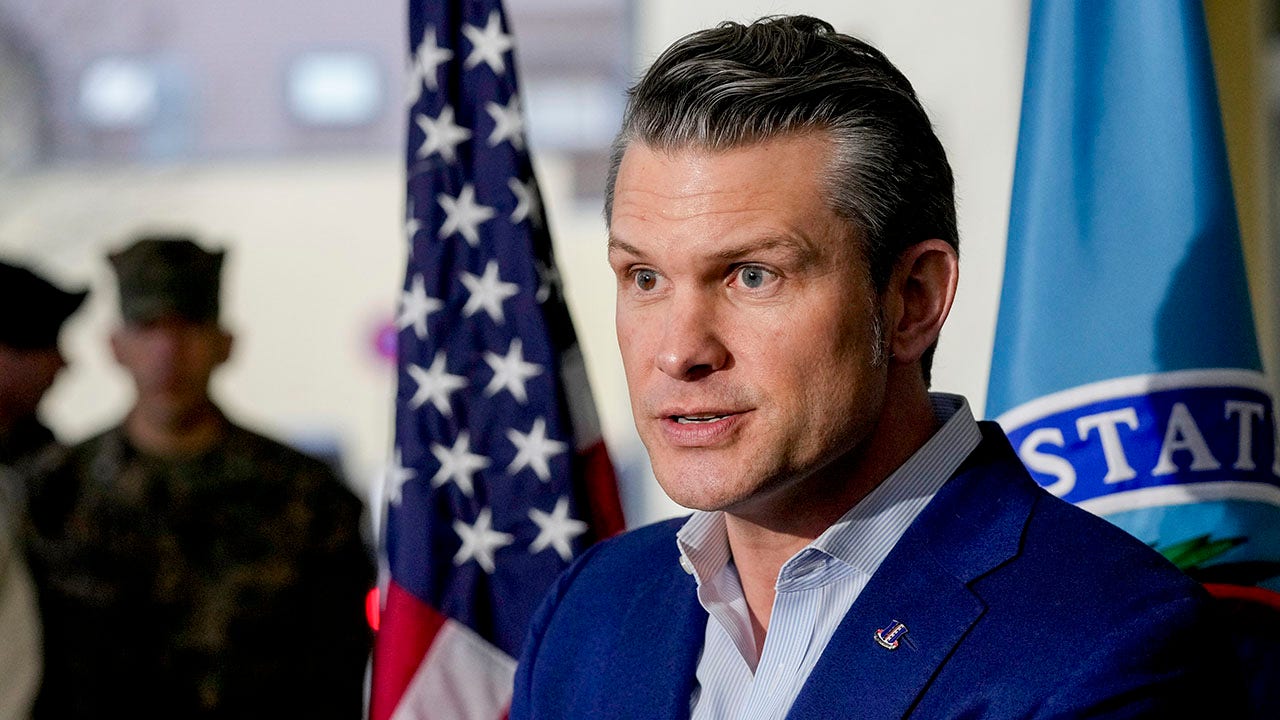Politics
Hegseth says DOGE welcome at Pentagon as Defense Department reviews military posture globally

Defense Secretary Pete Hegseth Emphasizes Efficiency and Warrior Ethos at the Pentagon
Defense Secretary Pete Hegseth, during his first overseas trip to Stuttgart, Germany, extended a welcoming hand to the Department of Government Efficiency (DOGE), signaling a new era of collaboration between the Pentagon and the efficiency-focused agency. Hegseth, a combat veteran, made it clear that the Department of Defense (DoD) is set to review the U.S. military posture worldwide, reflecting the differing strategic priorities of President Donald Trump and former President Joe Biden. The secretary’s visit included a stop at the headquarters of U.S. European Command and Africa Command, where he engaged in physical training exercises with the 1st Battalion, 10th Special Forces Group (Airborne). This gesture was not just a show of physical fitness but a deliberate effort to connect with troops on the ground, bypassing traditional channels of communication through senior leadership. Hegseth emphasized his commitment to restoring the "warrior ethos" at the Pentagon, a central theme of his tenure.
A Focus on Defense Spending and Global Alliances
During a press conference, Hegseth addressed President Trump’s call for NATO members to increase their defense spending to 5% of their GDP, a target Trump has consistently advocated for since his first term. When asked if the U.S. should adopt the same benchmark, Hegseth clarified that he and Trump believe U.S. defense spending should not drop below 3% of GDP. He criticized the Biden administration for underinvesting in military capabilities, asserting that Trump’s administration is committed to rebuilding America’s military through strategic investments. Hegseth also expressed optimism about a "partnership" with DOGE, led by Elon Musk, to identify and eliminate billions of dollars in Pentagon waste. However, he drew a clear line between the DoD’s mission and what he described as "globalist agendas" pursued by agencies like the U.S. Agency for International Development (USAID). For Hegseth, the Pentagon’s focus should remain on deterring and winning wars, not on addressing climate change or other non-defense priorities.
Rebuilding Military Readiness and Addressing Waste
Hegseth accused the Biden administration of neglecting critical military capabilities, a trend he vowed to reverse. He highlighted President Trump’s commitment to modernizing the military and ensuring it remains the most capable force in the world. While acknowledging the need for efficiency, Hegseth stressed that any cuts or reforms would be implemented in a way that does not harm U.S. operational or tactical advantages. He pointed to weapons procurement programs and headquarters redundancies as areas where DOGE’s expertise could be particularly valuable. Hegseth also emphasized that every dollar saved through efficiency measures would be reinvested into supporting warfighters, aligning with Trump’s "America First" agenda. This approach, he argued, would ensure that the U.S. military remains a dominant force on the global stage.
Global Force Posture and Strategic Priorities
When asked about potential shifts in U.S. military presence, particularly moving forces from Europe to the Indo-Pacific region to counter China, Hegseth stated that no immediate plans were in place for such a realignment. He did, however, acknowledge that a global force posture review was underway to align military positioning with President Trump’s strategic assumptions, which differ significantly from those of the Biden administration. Hegseth referenced the lessons of the Afghanistan withdrawal and the ongoing conflict in Ukraine, emphasizing the need for a balanced approach that strengthens alliances while addressing emerging threats. He also highlighted the importance of supporting key partners like Israel and working toward a peaceful resolution in Ukraine. For Hegseth, the U.S. military’s global posture must be adaptive and responsive to contemporary challenges without being dictated solely by past crises.
Fort Bragg Renaming and Honoring Military Legacy
One of Hegseth’s first acts as Defense Secretary was to reverse President Biden’s 2023 decision to rename Fort Bragg to Fort Liberty. Hegseth, who personally signed the order restoring the base’s original name, framed the move as a restoration of tradition and a nod to the institution’s storied history. While the base was initially named after Confederate General Braxton Bragg, Hegseth announced that it would instead honor Pfc. Roland L. Bragg, a World War II hero who earned the Silver Star and Purple Heart for his bravery during the Battle of the Bulge. The decision reflects Hegseth’s broader effort to reconnect the military with its historical roots while aligning with Trump’s "America First" vision.
A New Era of Collaboration and Efficiency
In his remarks, Hegseth repeatedly emphasized the importance of collaboration between the DoD and DOGE, expressing confidence that the partnership would yield significant savings without compromising military readiness. He praised Elon Musk as a "great patriot" who understands the importance of bringing business-like efficiency to government operations. While Hegseth acknowledged that the Pentagon is not perfect, he argued that identifying inefficiencies and addressing them would ultimately benefit both the military and the American people. As he looks to implement these reforms, Hegseth faces the dual challenge of modernizing the military while navigating the political and strategic complexities of a rapidly changing global landscape. His approach, rooted in a combination of fiscal conservatism and a commitment to military strength, reflects the priorities of the Trump administration and sets the stage for a new era of defense policy.
-

 Money3 days ago
Money3 days agoConsumer Financial Protection Bureau Adds Error Message To Home Page
-

 Australia22 hours ago
Australia22 hours agoTropical Cyclone Zelia intensifies to category 2 storm
-

 Money2 days ago
Money2 days agoWinning Content Strategies For Wealth Managers
-

 Asia23 hours ago
Asia23 hours agoWhat you need to know about 2024 YR4, the asteroid that could hit Earth in about eight years’ time
-

 Entertainment15 hours ago
Entertainment15 hours agoPrince Harry and Meghan Markle’s Best Moments and Photos From the 2025 Invictus Games
-

 Australia9 hours ago
Australia9 hours agoTropical Cyclone Zelia intensifies to category five system off Pilbara coast
-

 Politics23 hours ago
Politics23 hours agoDozens of religious groups sue to stop Trump admin from arresting migrants in places of worship
-

 Entertainment3 days ago
Entertainment3 days agoEvery Celebrity Who Attended the 2025 Super Bowl: A Guide to the A-Listers at the Big Game















